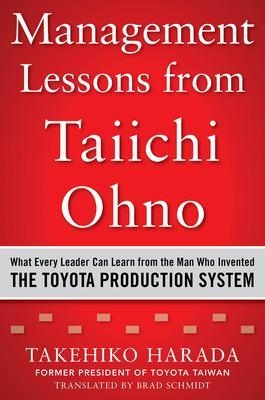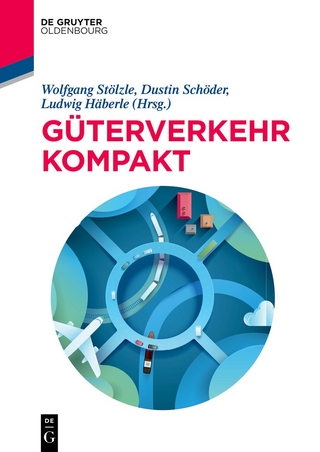
Management Lessons from Taiichi Ohno: What Every Leader Can Learn from the Man who Invented the Toyota Production System
McGraw-Hill Inc.,US (Verlag)
978-0-07-184973-9 (ISBN)
The 15 most powerful practices for guiding breakthrough productivity improvements in any company
Management Lessons From Taiichi Ohno provides firsthand knowledge of the tools, techniques, and challenges to implementing the Lean values of the Toyota Production System (TPS) in an organization. Takehiko Harada spent four decades applying Lean principles at Toyota with Taiichi Ohno, and the motivating insights he shares on maintaining a Lean culture are peerless.
More than a set of rules for managers and executives to implement, this personal guidebook is from the heart in an attempt to see other companies enjoy the rewards of the TPS values Toyota leaders dedicated their lives to serving. It puts you in touch with the actual people who learned the key to success is creating a workforce of smiling employees who find purpose to their work.
Real-world examples from Toyota as well as other companies striving to practice TPS/Lean fully demonstrate:
The 15 sayings of Taiichi Ohno—what his words mean and how his philosophies are practiced throughout Toyota The 4 Stages of Things—a very useful method for visiting the gemba, which is where the action takes place The managerial role—what management at the frontline should be, how it is different from a supervisor’s duties, and the critical motivational elements to creating a vibrant, happy workplace Bridging the cultural gap—indispensable wisdom for deploying the Toyota method in non-Japanese cultures
Takehiko Harada joined Toyota Motor Corporation in 1968, where he served as machine department head, project general manger of the Operations Management Consulting Division (Toyota’s TPS deployment group), and Head for engineering works.
Translator’s Notes and Insights ix
Introduction 1
CHAPTER 1: Learning from Mr. Taiichi Ohno
Lesson 1: No One Really Understood What I Was Saying, So I Had to Go to the Gemba and Give Detailed Instructions 7
Lesson 2: Kaizen Equals Getting Closer to the Final Process 11
Lesson 3: You Need by the Line Only the Parts for the Car You Are Assembling Now 17
Lesson 4: Building in Batches Stunts the Growth of Your Operations (Don’t Combine Kanbans and Build a Group of Them) 20
Lesson 5: Nine Out of Ten, One Out of Ten 24
Lesson 6: The Foreman or Leader Is the One Who “Breaks” the Standard (When You Make an Improvement and You Can Take Out One Person, Give Up Your Best Person) 29
Lesson 7: Multiskilling Means Learning the Next Process—Keep It Flowing Until You Reach the Last Process 32
Lesson 8: What’s That Red Circle on the Top Right of That Graph? 35
Lesson 9: Are You as the Manager Having Them Do It, or Are They Just Doing It Their Way? Which Is It, Man? 39
Lesson 10: Standard Work for the Andon Is, “Go There When It Flashes” 42
Lesson 11: Standard Work Is the Foundation of Kanban 45
Lesson 12: When the Worker Pushes the Start Button, He Has Stopped Moving. Can’t You Guys Figure Out a Way for Him to Push Start While Still Moving? 49
Lesson 13: You Bought an Expensive Machine, and Now You Want an Expensive Foreman or Engineer to Run It? Are You Mad? 52
Lesson 14: Engineers in Production Become the Horizontal Threads in the Cloth 55
Lesson 15: The Lowest Kanban Quantity Should Be Five 60
CHAPTER 2: The Role of the Top
The Management and Structure Needed to Have a Successful Toyota Production System Deployment 65
The Role of Top Management: People Who Can Change the Structure (Rules, Organization, and Operations) Based on Changes the Production Environment Faces 70
The Foundation of Operations: How the Top Should Look at Things from Four Perspectives 72
CHAPTER 3: The Role of Management: Enable Your Employees to Do the Work Well
To All You Managers Out There 81
Managers Are There to Create an Environment in Which Increases in Flow Happen 84
Giving Authority: Growing People You Can Empower 89
Management Should Make Workplaces That Motivate People to Work and Sustain the Motivation 98
CHAPTER 4: If You Respect Other People, They Will Trust You
Talk to the Top People and Other Expatriates About Their Experience 120
Think of Managing an Overseas Plant as a Three-Story Building 121
Make an Environment Where It’s OK to Say, “I’m Sorry” 127
Make the Toyota Production System a Pillar of the Management of the Entity 129
Be Proactive in Encouraging the Toyota Production System Inside and Outside Your Company 132
Choose a Local Manager for Working with Suppliers 134
How to Deploy the Toyota Production System in Suppliers 137
Top Management Must Visit and Coach Suppliers at Least Three Times a Year 139
The Factory Must Be Run by Local Management, Starting with the Factory Manager and All the Way Down 141
Make Japanese the Offi cial Company Language 143
Become an Executive Who People Can Trust. Respect Othersand They Will Trust You 145
Afterword: To Those Top Managers Who Are Thinking of Applying the Toyota Principles to Make a Wonderful Operation 151
Index 157
| Erscheint lt. Verlag | 16.7.2015 |
|---|---|
| Zusatzinfo | 0 Illustrations |
| Verlagsort | New York |
| Sprache | englisch |
| Maße | 163 x 234 mm |
| Gewicht | 377 g |
| Themenwelt | Wirtschaft ► Betriebswirtschaft / Management ► Logistik / Produktion |
| Wirtschaft ► Betriebswirtschaft / Management ► Unternehmensführung / Management | |
| ISBN-10 | 0-07-184973-4 / 0071849734 |
| ISBN-13 | 978-0-07-184973-9 / 9780071849739 |
| Zustand | Neuware |
| Haben Sie eine Frage zum Produkt? |
aus dem Bereich


